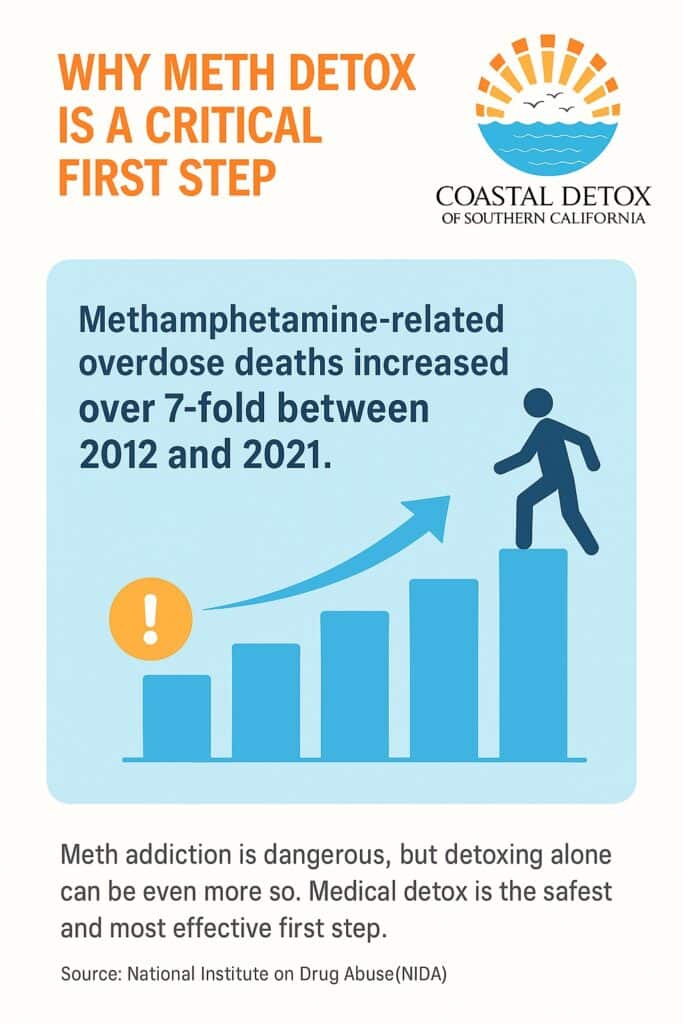
If you or someone you love is struggling with methamphetamine addiction, you’re not alone—and help is available. At Coastal Detox of Southern California, we offer medically supervised meth detox in San Diego designed to help individuals safely navigate withdrawal and take the first steps toward lasting recovery.
Methamphetamine, sometimes known as meth, is a highly addictive central nervous system stimulant with structural and molecular similarities to other amphetamines. Amphetamines (e.g., Adderall, Dexedrine), such as methamphetamine (Desoxyn), are frequently used for short-term weight loss or to manage obesity, in addition to being used to treat attention deficit hyperactivity disorder (ADHD), narcolepsy, and other diseases.
This drug is more commonly encountered in illicit forms, such as crystal meth, where it is more easily obtained. In the early twentieth century, methamphetamine was first synthesized from amphetamine to treat nasal congestion and trouble breathing. It’s finally readily available. Methamphetamine and other stimulants, such as amphetamine and cocaine, were classed as Schedule II narcotics in 1970, following the passage of the Controlled Substances Act, because they had a high potential for misuse and the propensity to induce substantial physiological dependence.
According to the 2019 National Survey on Drug Use and Health, 2 million Americans aged 12 and older used methamphetamine the previous year, making it the country’s second most commonly used illicit stimulant.


We provide a safe, comfortable, and effective environment to our patients.
Methamphetamine use often results in heightened energy levels and excessive physical activity. Individuals addicted to meth may exhibit restless behavior and an inability to sit still.
A pronounced sense of euphoria or “rush” is a common short-term effect of methamphetamine use. Frequent and escalating attempts to achieve this intense high may be indicative of addiction.
Individuals addicted to meth may experience heightened alertness and reduced appetite. Persistent periods of wakefulness and significant weight loss can be signs of ongoing substance misuse.
Methamphetamine addiction can lead to pronounced mood swings, including irritability, aggression, and heightened sensitivity. Sudden and extreme changes in behavior may be evident.
Methamphetamine use is associated with dental problems, commonly referred to as “meth mouth.” This includes tooth decay, gum disease, and the loss of teeth, often due to poor oral hygiene and dry mouth associated with meth use.
Long-term methamphetamine use can lead to paranoia, hallucinations, and delusions. Individuals may become increasingly paranoid about perceived threats or dangers.
Meth addiction can cause changes in the skin, including acne, sores, and scars. The repetitive behavior of skin picking, a phenomenon known as “meth mites,” is also associated with methamphetamine use.
Individuals addicted to meth may withdraw from social activities and neglect personal, professional, or academic responsibilities. The drug’s impact on cognitive function and behavior can contribute to social isolation.

Methamphetamine (meth) is a powerful and highly addictive stimulant that impacts both the body and brain. Long-term use can lead to physical exhaustion, mood disturbances, psychosis, and cognitive issues. Detox is the necessary first phase of treatment, helping individuals stabilize before entering therapy and long-term care.
→ According to the National Institute on Drug Abuse (NIDA), meth-related overdose deaths increased more than 7-fold between 2012 and 2021.
Detoxing from meth without professional support can be dangerous. Intense cravings, anxiety, depression, and even suicidal thoughts are common. Our San Diego-based clinic provides a safe, compassionate environment to begin your recovery.
The signs and symptoms of Meth withdrawal can vary from person to person. Particularly the amount of Meth you use and how often. Other factors can also affect withdrawal, for example, method of use. Those who inject Meth will typically have a more prolonged and intense withdrawal process than those who do not inject Meth.
Here are some examples of withdrawal signs and symptoms:
Withdrawal symptoms can begin within hours of the last dose and may last up to 10 days or longer. Struggling with withdrawal symptoms? Call Coastal Detox SC now for a confidential, judgment-free consultation.
Stimulant withdrawal is frequently less physically dangerous than other narcotics such as alcohol, opioids, and sedatives. Seizures may occur in certain persons as a result of methamphetamine withdrawal. Suicidal ideation and the likelihood of overdose during a relapse are two more potential risks.
It usually takes about a week for these symptoms to go away, although the time for each individual’s withdrawal symptoms may vary. Self-detoxification without medical supervision is highly discouraged and can have catastrophic consequences. There is no excuse to detox alone when professionals at the Coastal Detox of Southern California can help you manage withdrawal symptoms.
Our medically supervised detox program helps reduce discomfort and risks while preparing you for the next recovery phase. You can expect:
• 24/7 clinical and medical supervision • Emotional and psychological support during mood shifts • Nutritional support and restorative care • Holistic therapies to promote relaxation and healing • Safe, private, and calming residential environment
Every detox plan is personalized to meet your needs and ensure your safety at every stage.
Getting Meth Detox in San Diego is pretty straightforward. All you need to do is contact our consultant to schedule an evaluation, after which stabilization from withdrawal symptoms begins. Most methamphetamine users are familiar with the collapse following a meth binge and for a good reason. This step of the detoxification process often lasts only a few days and is the hardest to complete. Although this is the first stage of withdrawal symptoms, it is only the beginning of the process.
In most cases, the symptoms of methamphetamine withdrawal linger longer than other substances. Most symptoms will go away in three weeks or less, while some may last a month or longer. Some of the most severe side effects that may arise 3 days after the last usage of the medicine are depression, anxiety, and extreme tiredness. The individual attempting to quit using meth will have significant cravings for the substance during the detoxification phase. Because a person will almost likely crave or seek to use meth to relieve their symptoms, a medical detox under the direction of a professional is usually recommended.
Meth Detox at the Coastal Detox of Southern California also entails the use of drugs. Restlessness and irritability are common side effects of meth withdrawals, and anti-anxiety medications like benzodiazepines are commonly prescribed. Bupropion, an antidepressant, is sometimes prescribed to those in recovery who are experiencing meth cravings.
Completing meth detox is only the beginning. After stabilization, our team will help you transition into a personalized treatment plan that may include:
•Crash phase: Begins within 24 hours and can last 1–3 days • Acute withdrawal: 7–10 days with intense symptoms •Protracted withdrawal: Weeks to months of mood swings, cravings, and sleep issues
The duration depends on how long and how heavily meth was used, as well as individual physical and mental health.
Completing meth detox is only the beginning. After stabilization, our team will help you transition into a personalized treatment plan that may include:
• Inpatient residential rehab • Intensive outpatient programs (IOP) • Behavioral therapy (CBT, DBT, trauma therapy) • Group and individual counseling • Relapse prevention planning
Looking for continued care? Learn more about our residential and outpatient treatment options.

We’re more than just a detox center—we’re a gateway to long-term healing. Here’s why people choose us:
We aim to heal the internal affliction that causes substance abuse disorder in order for each drug addict and alcoholic to experience a fulfilling and successful life in recovery.
Contact Us Today for a Free Confidential Assessment and Insurance Verification.
Contact Us Today for a Free Confidential Assessment and Insurance Verification.
At this time we do not accept Medi-Cal , however private pay options are available.
Accessible for individuals with disabilities and accommodating to pets upon approval.
Call now to start your journey to freedom from addiction. Our compassionate care, tailored to your needs, offers hope and success. Verify insurance today.
All calls are 100% free and confidential
